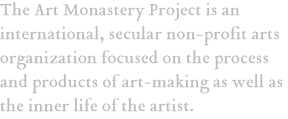More from “Re-monking”
After reading Re-Monking the Church: new monasticism (see my previous post), I sent Dr. Armstrong the following note on his “Ask Dr. Church History” page:
I just finished reading your fantastic article “Re-Monking the Church: new monasticism.” A question: In your mind, what does the secular world have to learn from monasticism?
I think the “Lure of Tradition” and the “Longing for Connectedness” are as relevant to non-Christians as to Christians. You write, ‘Can Western monasticism’s “father,” Benedict, still give us an antidote to cultural compromise?’ Do you think that could apply on an interfaith or even secular level?
You mentioned monastic dialogue between catholics and protestants. For those in the “new monastic” movement, what kind of interfaith conversations are happening? I’m aware of something like this at http://www.monasticdialogue.org.
This is a particularly interesting topic for me. I live in a ex-Franciscan convent north of Rome with a community of musicians, dancers and painters (of
all faithsany faith) working to apply the the wisdom of monasticism—contemplation, routine, shared meals, eco-efficiency, renunciation, periods of silence, rules, vows, etc.—to art-making and community-building. We call ourselves “artmonks,” and we inhabit an “Art Monastery.” All of which is to say: I’m certain we would have a lot to learn from the “Re-monks” you mentioned in your article!Looking forward to reading “Patron Saints for Postmoderns”, not to mention “Medieval Wisdom for Modern Protestants” and “Resources for Radical Living”!!!
…
His response was illuminating and forthright:
Nathan, I think Christian monasticism, like Christian ethics, shares many insights with other traditions. It addresses universal human needs in its disciplines of contemplation, silence, humility, and obedience; in its communal intentionality toward a common spiritual goal; in the rhythm of work and worship.
As one who believes in the uniqueness and exclusivity of Christ, I would have to say that I would expect the fruit of all of those insights to be greater in the life of monastics who ground their lives in the Incarnation and redemptive life, death, & resurrection of Jesus Christ.
So, could something of value come from the sort of monastic dialogue that Thomas Merton engaged in toward the end of his life, with other forms of monasticism (or as in the case of your community, with secular appropriations of monastic “techniques”)? Sure, but I would expect to see a ceiling or limit on that value. To me the greatest fruit of such engagement would still come from people submitting their lives to Christ. In him is salvation.
…
My response to him:
Heartfelt thanks, Dr. Armstrong, for your considered response.
This is exactly what I was looking for: “[Christian monasticism] addresses universal human needs in its disciplines of contemplation, silence, humility, and obedience; in its communal intentionality toward a common spiritual goal; in the rhythm of work and worship.”
Our goal as a community is to respect and learn from tradition. Many of us indeed find deep inspiration in the life of Jesus (and in the lives of Antony of Egypt, Augustine, Hildegard, Francis, etc.). I’m sure some of us would agree with you that in Jesus (and Jesus alone) is salvation, and I fully respect the decision to submit to his unique wisdom.
It is my hope that the modern world continues to find in the techniques and technologies of monasticism something appropriable.
…
Dr. Armstrong ended the exchange:
You’re welcome. And may God bless the fascinating endeavor you and your brothers have embarked on.
Leave a Reply
You must be logged in to post a comment.




